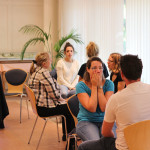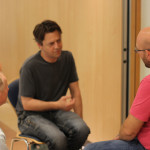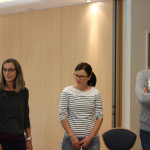The basic intention of the CCR Programs is to offer caregivers the understanding and skills necessary for resolving conflict in a way that moves the relationship from “symmetry” to what we refer to as “alliance”.
If “symmetry” is defined as an oppositional antagonistic relationship, “alliance” can be defined as a relationship grounded in a common direction with common goals. Between a caregiver and patient that would be identified as the therapeutic relationship or a trust relationship. Within a team, between colleagues, that can be called a collaborative relationship. Within the organizational hierarchy, that is referred to as a supportive relationship. And within the individual that is a centered or integrated relationship.
Simply put, the program offers the caregiver:
• Teachings and methods are introduced for discovering a universal perspective which is in contrast to the habit of taking conflict personally. Being able to meet conflict from a universal perspective free from being trapped in symmetry and taking the conflict personally is essential for a caregiver to respond effectively in accordance with their mandate.
• Identifying the nature of physical conflict and the different levels that express it. Knowing the proper response for each level and learning how to de-escalate the conflict and return it to conscious therapeutic communication.
• Skills, strategies and perspectives that enable a caregiver to face and respond to physical, verbal and nonverbal forms of conflict in a way that protects and honors their physical integrity while supporting the therapeutic relationship he/she has with the patient. Skills such as responding to grabs, strikes, resistance, chokes, responding to a weapon, moving a patient, relaxing a patient, immobilizing a patient, all done while maintaining the therapeutic relationship, are covered.
• An approach for addressing conflict with colleagues and supervisors in such a way that the caregiver can express important needs and perspectives from a position of mutual trust, collaboration and support rather than competition and symmetry.
- Ways of becoming more conscious of personal motivations and intentions as a way to develop personal coherence and responsiveness. This is done to support action that serves the nature of the individual, the relationship and the hospital structure.
- Exercises for centering before conflictual situations, recentering during and after conflict, and personal debriefing to assist in processing conflict that supports the caregivers’ development and understanding.
MODULE PROGRAMS FOR CCR PROGRAM
Module 1 Caregiver and Patient in Physical Conflict (15 participants maximum)
This module is lead by 2 facilitators and a team of assistants
- Centering in preparation for crisis
- Symmetry vs. Alliance
- Containing, assessing and mediating in physical crisis situations with patients to assist in de-escalation and resolution.
- Physical strategies and responses to physical conflict and attack that remains in Alliance and honors the Therapeutic relationship.
Module 2 Crisis Intervention (15 participants maximum)
This module would require 2 facilitators and a team of assistants
- Centering
- Symmetry vs. Alliance
- 2-5 person team direct physical intervention training to safely contain, immobilize and move a patient.
Module 3 Team conflict resolution and problem solving (30 participants maximum)
This module is lead by 2 facilitators
- Centering
- Symmetry vs. Alliance
- Listening, Dialogue and accessing multiple perspectives in verbal conflict and problem solving between collegues
- Team building
- Vision and mission clarification
Module 4 Internal Centering, Resourcing, Conflict Resolution (30 participants maximum)
This module is lead by 2 faciliators
- Centering and Relaxation
- Symmetry vs. Alliance
- Strategies for Resourcing
- Addressing Burn out
- Strategies for personal debriefing
Module 5 Physical Role Playing in Work Scenerios (15 participants maximum)
This module is lead by 2 facilitators and a team of assistants
- Covering all possible conflict situations with patients from verbal to physical
Each module can be 4.5 hours long and are complete independently as well as connected to the other 4 modules. (Except for Module 5, which would require Modules 1 & 2 as a prerequisite.)
If we scheduled each spring/fall a series something like this:
Two times Module 1 & 2 (2 times 9 hours)
- 2 groups of 15 participants each, total of 30 participants
One time Module 3 & 4 (9 hours)
- 1 group of 30 participants
Two times Module 5 (2 times 9 hours)
- 2 groups of 15 participants each, total of 30 participants
The course introduces the nature of conflict trapped in symmetry. It shows how to identify and leave symmetry, reaffirm a relationship based on alliance and resolve the conflict in accordance with the therapeutic relationship. The course also emphasises responding to physical conflict with a skills and techniques that work in an integrated manner allowing for effective response without invasive or aggressive action. The abilities to frame, contain and guide a patient physically in such a way that does not stimulate a resistive or fight reaction from the patient are central to the approach. From here we include verbal and nonverbal skills based on the same nonsymmetrical “alliance” relationship; listening, framing, containing, and guiding a patient in a conflict situation that supports the therapeutic relationship.
The course also covers perspectives on how to resolve verbal conflict between colleagues within a team. We include role-playing, that feature the skills of listening, accessing multiple perspectives and meta communication as an approach to negotiating and resolving verbal conflict. The caregiver is also introduced to process and relate to conflict after the situation has passed in such a way that enables greater understanding and development.

 Français
Français

